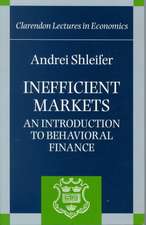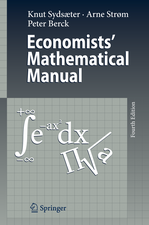The Driving Force of the Collective: Post-Austrian Theory in Response to Israel Kirzner
Autor Guinevere Liberty Nellen Limba Engleză Hardback – 2 dec 2016
Preț: 643.00 lei
Preț vechi: 756.47 lei
-15% Nou
Puncte Express: 965
Preț estimativ în valută:
123.04€ • 128.72$ • 102.21£
123.04€ • 128.72$ • 102.21£
Carte tipărită la comandă
Livrare economică 02-16 aprilie
Preluare comenzi: 021 569.72.76
Specificații
ISBN-13: 9781137473561
ISBN-10: 1137473568
Pagini: 308
Ilustrații: XII, 294 p.
Dimensiuni: 148 x 210 x 22 mm
Greutate: 0.49 kg
Ediția:1st ed. 2017
Editura: Palgrave Macmillan US
Colecția Palgrave Macmillan
Locul publicării:New York, United States
ISBN-10: 1137473568
Pagini: 308
Ilustrații: XII, 294 p.
Dimensiuni: 148 x 210 x 22 mm
Greutate: 0.49 kg
Ediția:1st ed. 2017
Editura: Palgrave Macmillan US
Colecția Palgrave Macmillan
Locul publicării:New York, United States
Cuprins
1. Collaborative Discovery and the Conversive Democratic Process: A Post-Austrian Approach.- 2. The Individualist Subjectivism of Austrian Economics.- 3. Subjectivism, Freedom, and Social-Interest.- 4. The Limits of Democracy: The Real and the Imagined.- 5. The Ethics of Competition and Cooperation.- 6. Some Ethical Insights on the Nature of Profits.-7. Coordination and Collaboration: Agreement as a Criterion for Democratic Goodness.- 8. Reflections on the Misesian Legacy of Hyper-Individualism.- 9. Knowledge and the Austrian Understanding of the Democratic System.- 10. Culture, Hayek, and the idea of Plan-Coordination.- 11. Conversation and the Democratic Process: Some Doctrinal Touchstones.- 12. The Driving Force of the Collective: The Idea of “Conversation” in Contemporary Economic Theory and in the Post-Austrian Theory of the Democratic Process.- 13. Misallocation and/or Misunderstood: A Reconsideration of the Misesian Calculation Problem.- 14. Society, the Collective, and Economic "Imperialism".
Notă biografică
Guinevere Liberty Nell studied and published in Austrian economics and Soviet history, and worked as a programmer and as a tax policy analyst at The Heritage Foundation in Washington, D.C. before earning a Master's Degree in Soviet economic history from the University of Warwick, UK. She is the author of Rediscovering Fire: Basic Economic Lessons from the Soviet Experiment and Spontaneous Order and The Utopian Collective, and editor of three essay collections that push the boundaries of Austrian economics.
Textul de pe ultima copertă
This book investigates why Austrian economists fail to apply the spontaneous order framework to cooperative relationships – such as a dynamic and evolving public sector – that might complement a thriving market. In direct response to Israel Kirzner's The Driving Force of the Market, Nell challenges traditional Austrian economics by proposing "democratic process theory" as a parallel to market process theory, highlighting the possibilities for an economic organization that harnesses the power of transparent and effective democracy. Keeping in mind the central problems experienced in socialist and capitalist countries due to self-interested political and economic actors, The Driving Force of the Collective highlights the public sector advantages of allowing culture and institutions to evolve endogenously as a spontaneous public sector order.
Caracteristici
Presents the case for a new branch of (post-)Austrian theory Highlights fundamental blind spots in Austrian theory Argues that modern societies need the force of both markets and collectives











